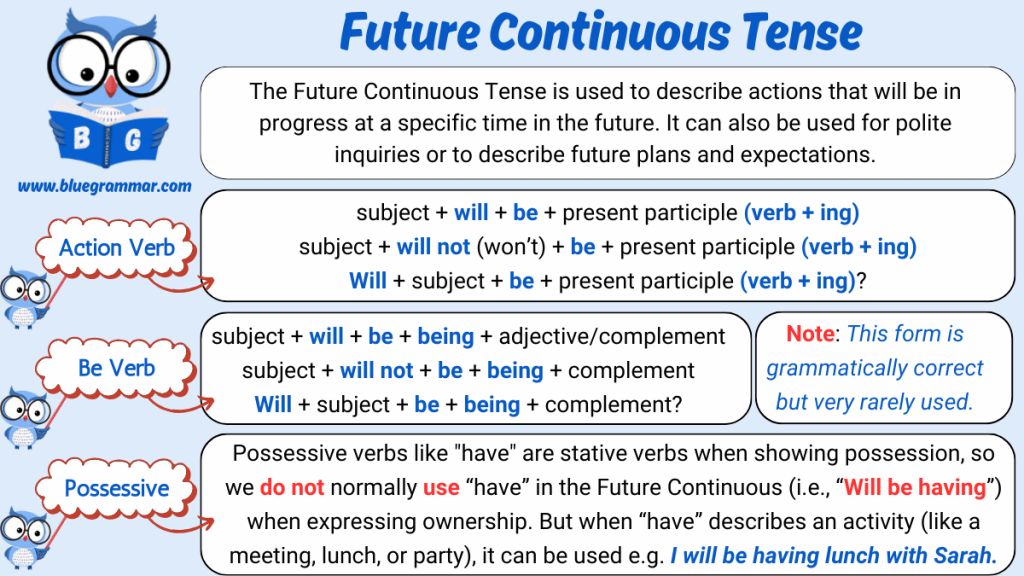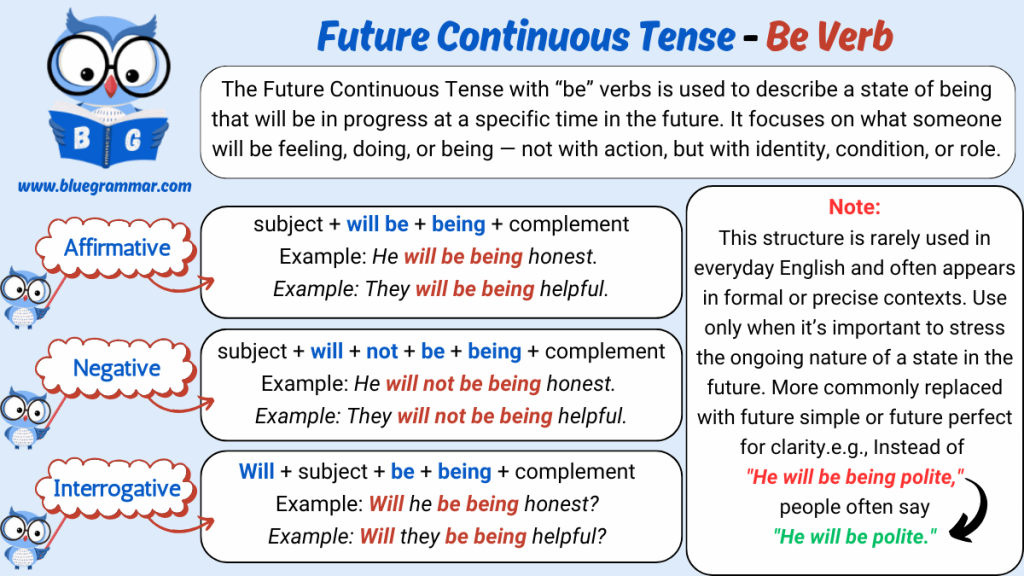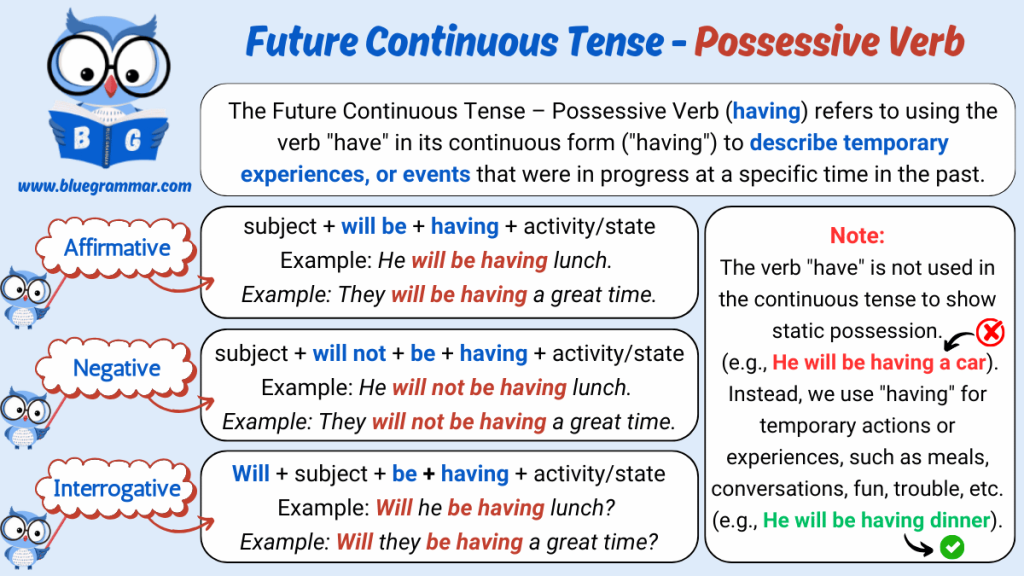
The Future Continuous Tense is used to describe actions that will be in progress at a certain time in the future. It emphasizes that something will be happening continuously over a future duration. This tense helps us express ongoing actions, future plans, or predicted events that will not be completed at a specific future time.
Future Continuous Tense : Action Verb
Why We Use Action Verbs in Future Continuous Tense?
Action verbs are used in the Future Continuous Tense to describe activities that will be happening at a particular moment or during a specific time period in the future. These verbs indicate an action that starts before a certain point in the future and is still ongoing at that moment. This tense is often used:
- To describe future events in progress
- To set the scene in storytelling
- To show polite or indirect inquiries
- To indicate planned future arrangements
It is commonly used in conjunction with time expressions such as:
- At this time tomorrow
- At 8 o’clock tonight
- Next week
- This time next year

Structure for Positive Sentences
Subject + will be + verb(-ing) + object/time phrase (if any)
“Will be” remains the same for all subjects (I, you, he, she, it, we, they).
The main verb takes the present participle or -ing form.
Examples:
- I will be working at 10 AM tomorrow.
- She will be studying for her exams next week.
- They will be traveling to Islamabad in the morning.
- We will be watching the match tonight.
- He will be writing his report by then.
- You will be waiting for the train at that time.
- The children will be sleeping when we arrive.
Structure for Negative Sentences
Subject + will not be (won’t be) + verb(-ing) + object/time
Examples:
- I won’t be attending the seminar.
- She will not be working late.
- They won’t be playing in the park tomorrow.
- He won’t be using the car tonight.
- We will not be visiting our cousins next weekend.
- You won’t be cooking dinner at that time.
Structure for Interrogative Sentences
Will + subject + be + verb(-ing) + object/time?
Examples:
- Will you be studying at 9 PM?
- Will she be driving to the office tomorrow?
- Will they be joining us for dinner?
- Will he be working on Saturday?
- Will we be staying at the hotel?
Future Continuous Tense : Be Verb
Why We Use Be Verbs in Future Continuous Tense?
The verb “be” can be used in the Future Continuous Tense, but not in the same way as action verbs. We use “being” (the present participle of “be”) to refer to someone’s temporary behavior, attitude, or a state that is not typical. It’s rare and used only in specific cases to talk about someone behaving unusually or temporarily acting a certain way in the future.
You should not use “being” with permanent roles or states in continuous forms. For those, use Future Simple instead.

Structure for Positive Sentences
Subject + will be + being + adjective/noun
Examples:
- He will be being careful with the equipment tomorrow.
- You will be being very patient during the session.
- They will be being helpful throughout the process.
Structure for Negative Sentences
Subject + will not be (won’t be) + being + adjective/noun
Examples:
- He won’t be being honest if he hides the truth.
- She will not be being respectful in that situation.
- They won’t be being fair to others.
Structure for Interrogative Sentences
Will + subject + be + being + adjective/noun?
Examples:
- Will he be being rude again?
- Will they be being supportive during the meeting?
- Will she be being honest with her feedback?
Future Continuous Tense : Possessive Verb
Why We Use Possessive Verbs in Future Continuous Tense?
Possessive verbs like have and own are generally not used in the continuous tenses to express permanent possession, because they describe states, not actions. However, when “have” means a temporary experience or activity (such as having lunch, having fun, or having a meeting), it can be used in the Future Continuous.
This usage implies that someone will be engaged in or experiencing something at a specific future time.

Structure for Positive Sentences
Subject + will be + having + object/experience
Examples:
- I will be having lunch with my boss at 1 PM.
- She will be having a meeting with the client.
- They will be having a good time at the beach.
- He will be having a shower when you call.
- We will be having a party next Saturday.
- You will be having an interview at 11 AM.
Structure for Negative Sentences
Subject + will not be (won’t be) + having + object/experience
Examples:
- I won’t be having dinner until late.
- She will not be having a great day if it rains.
- They won’t be having any fun at that boring event.
- We will not be having guests tonight.
- He won’t be having his coffee until noon.
Structure for Interrogative Sentences
Will + subject + be + having + object/experience?
Examples:
- Will you be having lunch with us
- Will she be having a good time?
- Will they be having a meeting?
- Will we be having dinner by 8 PM?
- Will he be having any problems?
Important Notes:
Use Future Continuous to describe an ongoing event in the future, not a completed one.
- Correct: I will be working at 10 AM.
- Incorrect: I will work at 10 AM. (This is Future Simple.)
Use time expressions like “this time tomorrow,” “at 8 PM,” “next week at this hour” to add clarity.
Do not use stative verbs in continuous tenses (e.g., believe, know, own) unless used in an action/temporary sense.
“Being” should only be used when describing temporary behavior, not permanent states.
- Correct: She will be being helpful.
- Incorrect: She will be being a doctor. (Use: She will be a doctor.)
For scheduled future events, Future Continuous sounds more polite and less direct than Future Simple.